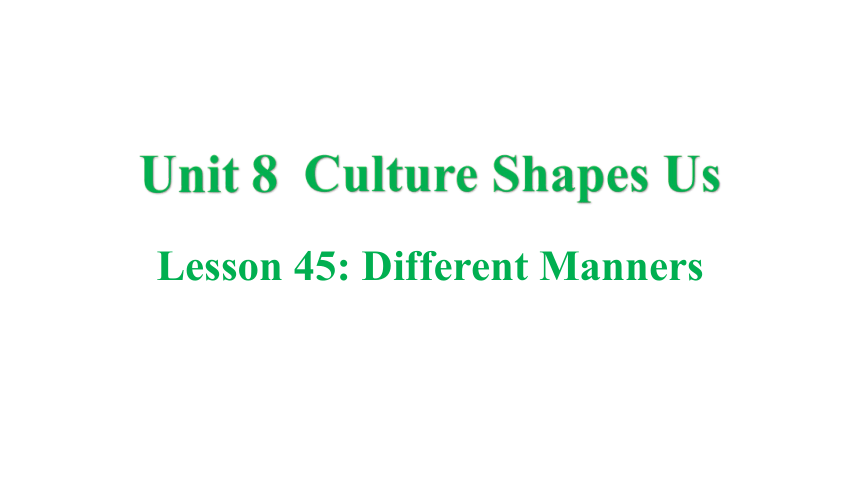(
课件网) Lesson 45: Different Manners Unit 8 Culture Shapes Us 单词: manners, though, modest, virtue, praise, private, elderly, guest, extra, waiter, tip 短语: take turns 句子: (1)Though I have lived here for a long time, I still don't feel Canadian. (2)I have many good friends in Canada although Canadian culture is different from Chinese culture. (3)When Chinese people eat out in a restaurant, they may take turns paying for the meal. (4)In Canada, however, people often share the cost of a meal. Learning Goals 1 能用英语描述中外文化的差异。 2 Free Talk What do you think are good manners Presentation THINK ABOUT IT In your opinion, what are good manners Do you think cultures shape manners My name is Wu Zhou. I have lived in Canada for twenty three years. In Canada, I call myself Joe Wu. Joe is an English name that sounds like Zhou. Though I have lived here for a long time, I still don′t feel Canadian. This is probably because North American manners and Chinese manners are so different. In China, being modest is a virtue. If someone praises you and says that your English is excellent, you should be modest and say, “No, no. My English is still poor.” But in North America, this is usually a sign of being weak and not confident. You should just say, “Thank you.” In Canada, people only ask children about their age. It′s not polite to ask an adult′s age. They think it is private. But this is common in many places in China. In both China and North America, it is polite to offer an elderly person a seat on the bus. In North America, however, an elderly person may feel embarrassed about being offered a seat. When Chinese people eat out in restaurants, they may take turns paying for the meal. In Canada, however, people often share the cost of a meal. In China, if your guests have no food on their plates, it's polite to put food on their plates. In Canada, you pass food to guests, but you don′t usually put food on their plates. In China, people seldom give extra money to waiters, waitresses, taxi drivers or hotel workers. In North America, this is always done. It is called “tipping”. It′s interesting to experience two different cultures. I think understanding cultural differences really helps us to understand each other, live together and work together. Vocabulary manners though modest virtue praise n. 礼仪;习俗;礼貌 conj. 虽然;尽管;即使;然而 adj. 谦虚的;谦恭的 n. 美德 n. 称赞;赞扬 private elderly guest extra waiter tip adj. 私人的;私有的 adj.上了年纪的;较老的 n. 客人 adj. 额外的;另外的 n. (餐馆的)男服务员 v. 给小费 take turns 落后 Structures and Expressions Let’s do it! 1. Read the lesson and match the behaviours with the correct countries. asking an adult′s age putting food on a guest’s plate giving a tip to waiters and hotel workers sharing the cost of a meal in a restaurant Canada China 2. Match and complete the sentences. Although people have different cult ... ...

